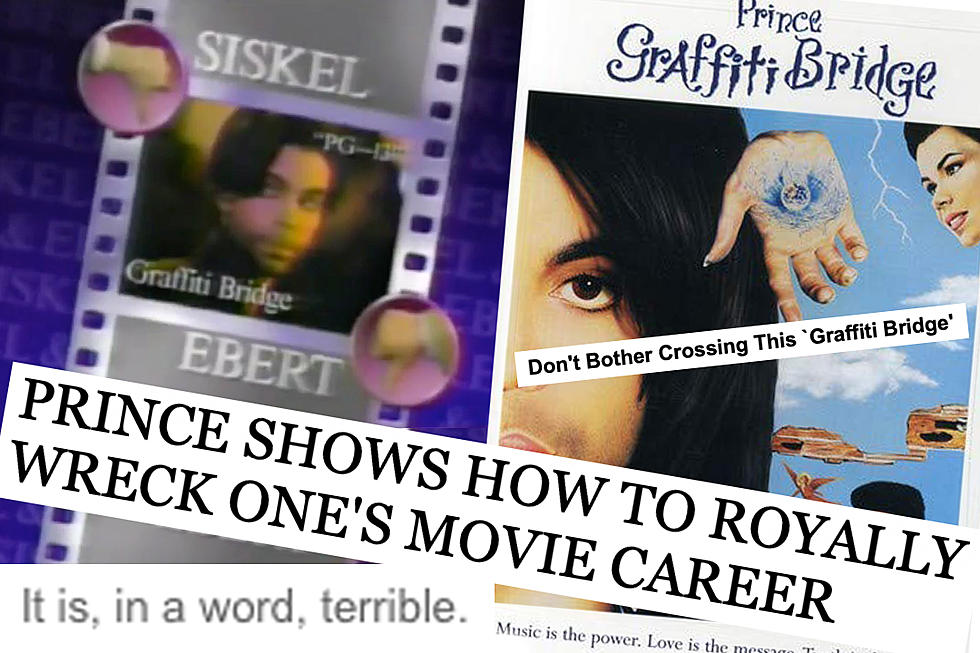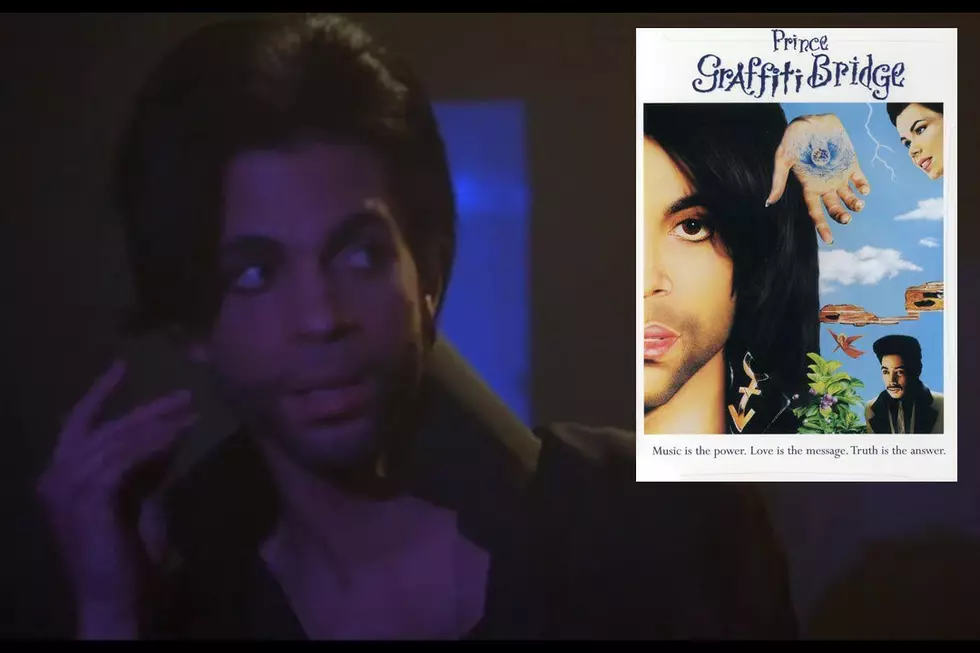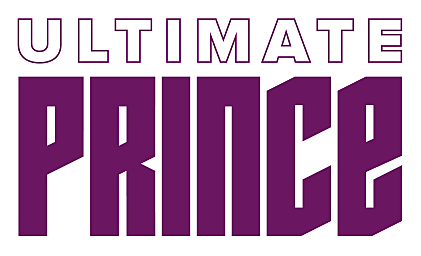
What Critics Said About ‘Graffiti Bridge': ‘In a Word, Terrible’
Prince's movie career bottomed out with Graffiti Bridge. The film, which premiered on Nov. 1, 1990 before seeing wider release on Nov. 2, received so many negative reviews and was such a box-office flop that he never made another full-length feature again.
A sequel to Purple Rain, Graffiti Bridge finds Prince returning as the Kid. He now co-owns the Glam Slam, a Minneapolis nightclub, with nemesis Morris Day, who's looking to gain full control of it. The Kid comes under the influence of an angel named Aura (Ingrid Chavez), as she moves his life and music in a more spiritual direction. (That actually mirrored Chavez's impact on Prince's real life at the time.) The Kid and Day end up battling for Aura's affections, just as they had with Apollonia six years earlier.
Interspersed throughout the film were a handful of new Prince songs, including the hit "Thieves in the Temple," a few from the Time, and tracks by newcomer Tevin Campbell ("Round and Round") and legends George Clinton ("We Can Funk") and Mavis Staples ("Melody Cool"). They all had roles in the movie, as well.
Most of the venom was leveled at Prince. Most critics liked the music and performances, even if some didn't feel the songs were among his best, but they felt Prince made a mistake by also serving as the writer and director. Some also noted that, for all his charisma, Prince had serious deficits as an actor.
Not everybody savaged the movie, however, so we've included some of the positive reviews. Nonetheless, Graffiti Bridge has a rating of 19 on Rotten Tomatoes and was nominated for five Golden Raspberries, the awards given out annually to a year's worst movies. Graffiti Bridge notably failed to "win" any, with those in charge preferring to recognize Andrew Dice Clay's movie The Adventures of Ford Fairlane, which also co-starred Morris Day; and Bo and John Derek's Ghosts Can't Do It, which was also given a Worst Supporting Actor award for future president Donald Trump.
The 'New York Times' Kinda Liked 'Graffiti Bridge'
Janet Maslin appreciated that Graffiti Bridge had the "sunniness of an old back-lot musical" without sacrificing its sense of modernity, but admitted that the plot and Prince's acting and direction were no great shakes: "Only when he stops dancing and starts talking does the film hit its snags." Still, she called Morris Day "delightful" and said "the film has a lively style, a galvanizing score and some dance numbers in which the star truly shines."
The Same Can't Be Said for the 'Washington Post'
In a scathing review, Richard Harrington said that Under the Cherry Moon "looks like Citizen Kane" by comparison. He took particular exception to the religious subtext. More thoughtfully, he contrasted it with Purple Rain, saying that while the energy of the first movie "came from real performances folded into the plot, the musical numbers here feel not only unconnected but lip-synced, badly in several instances." But ultimately, he questioned the effect that such a bomb would have on Prince's career: "Reputation-wise, no one gets out of this film alive."
Gene Siskel & Roger Ebert Gave the Movie Two Thumbs Down
On their television show, the two critics, arguably the most influential in the U.S., both panned it. Roger Ebert noted that the three best qualities of Purple Rain – its energy, passion and conviction – were all missing from Graffiti Bridge. And Gene Siskel was so disappointed by it that, "I now have to wonder if [Purple Rain] was a fluke." They agreed that it didn't even have an "electrifying song-and-dance sequence" to lift the movie.
Christy Lemire Said 'Graffiti Bridge' was 'In a Word, Terrible"
In a retrospective review, Christy Lemire said that the film's "small and chintzy" look ran contrary to Prince's image. Although she liked the musical numbers, particularly those involving the side characters (she especially loved Campbell's "Round and Round"), Lemire didn't think the songs were among Prince's best. Most troubling to Lemire, who admits she was "too busy being a drunk sorority girl" to see Graffiti Bridge in 1990, was the film's treatment of women. "Aside from Aura, who’s an angel, the other ladies are scantily clad and understandably angry. They’re either used as arm candy or cast aside," she wrote. "Like the overall look of the film, its treatment of women has not aged well."
The 'Orlando Sentinel' Said It Was Worse Than Elvis Presley's and Madonna's Movies
Jay Boyar wrote that Graffiti Bridge took the awful movies made by musicians like Elvis Presley and Madonna to a new level because, unlike Prince, they had the sense to neither write nor direct their turkeys. But the ultimate disappointment for him was that, for all this movie's flaws, Prince was still "an astonishingly seductive screen presence."
'TV Guide' Called It 'Technically Inept'
TV Guide felt that it was a step up from Under the Cherry Moon because Prince "holds his ego a little more in check," although even the songs were "buried under so much tedious pretension." They savaged all the actors – including the extras – but, ultimately the blame lay at the feet of the star. "[H]is ego and his bizarre philosophies about life conspire to undermine his movie potential," they said. "The musings about spirituality which permeate the film are puzzling, if not silly."
Flavorwire Disagreed With 'TV Guide'
Writing in 2016, Jason Bailey followed Maslin's appreciation for Graffiti Bridge as a "good, old-fashioned, backlot musical." He wrote that it was "certainly far from perfect," but that the screenplay, for all its flaws, succeeded in its role of holding the music together. What he really liked was Prince's direction, which he called "even sharper this time around, heavy on the Dutch angles, wild lenses, and energetic editing of the concurrent Black New Wave, and he fuses his musicality with his filmmaking even more sharply."
'Empire' Called It 'Incoherent, Self-Indulgent and Incompetent'
An uncredited review at Empire minced no words, saying Graffiti Bridge "appears to be the work of infants — or at least, of an adult living in a state of suspended infantilism." The writer also chastised Staples, an icon of the Civil Rights movement, for her involvement: She "really should know better, as it’s all in the service of outmoded and demeaning black pimp / hood / bitch stereotypes that should have been thrown out back in 1984 with Purple Rain."
The 'Los Angeles Times' Felt It Rose Above Its Shortcomings
While admitting that "parts of it are awful," Michael Wilmington admired that Prince's ability to let Day and Jerome Benton steal scenes ran contrary to his persona as a narcissist. He also noticed a "weird dichotomy. So obsessed with sensuality that it focuses on writhing buttocks and thighs throughout, it winds up swooning into spirituality, a movie-movie mysticism with faint echoes of Vincente Minnelli and Brigadoon.”
The 'Seattle Times' Said 'Graffiti Bridge' Was More of a Video Than a Movie
"Technically, the film is a compendium of stale MTV gimmicks – dry ice, stylized sets," wrote Michael Upchurch, who felt that even Prince's performances were "less fun" than in previous movies. He criticized Day's recycled jokes from Purple Rain and also the "homophobia and misogyny" on display. Ultimately, he felt that the film's "biggest flaw, however, is that it's about such a tiny, tiny world. This guy needs to get out of the house more!"
'Graffiti Bridge' Got a D- From 'Entertainment Weekly'
"The movie can barely muster the energy to get from one shot to the next," wrote Owen Gleiberman in a review where he called the entire project "a sad fiasco." He didn't even appreciate the songs, believing that "except for Shake!' the music (at least to my ears) is Prince at his most joyless, a collection of glorified rhythm tracks. For the first time, the revolutionary funkster seems to be preaching to a world that has left him behind."
Prince’s Bandmates: Where Are They Now?
More From Ultimate Prince









